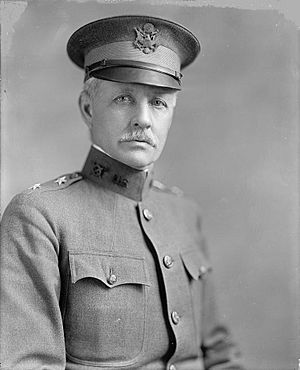John Loomis Chamberlain facts for kids
Quick facts for kids
John Loomis Chamberlain
|
|
|---|---|

John L. Chamberlain
|
|
| Born | January 20, 1858 South Livonia, New York, U.S. |
| Died | November 14, 1948 (aged 90) Washington, D.C. |
| Place of Burial | |
| Allegiance | United States |
| Service/ |
United States Army |
| Years of service | 1880–1921 |
| Rank | Major General |
| Service number | 0-9 |
| Commands held | Inspector General of the U. S. Army |
| Battles/wars | American Indian Wars Spanish–American War Philippine–American War World War I Occupation of the Rhineland |
| Awards | Army Distinguished Service Medal |
| Spouse(s) | Carolyn Marrow (m. 1896) |
| Children | 2 |
John Loomis Chamberlain (born January 20, 1858 – died November 14, 1948) was an important officer in the United States Army. He served in many wars, including the American Indian Wars, the Spanish–American War, the Philippine–American War, and World War I. He became a Major General and was best known for being the Inspector General of the United States Army from 1917 to 1921.
Contents
Growing Up and Starting His Career
John Loomis Chamberlain was born in South Livonia, New York, on January 20, 1858. He went to a local school and then to Geneseo Normal School. In 1876, he earned a spot at the United States Military Academy, also known as West Point. He was a very good student, graduating in 1880 as one of the top students in his class. He became a second lieutenant in the Field Artillery.
After West Point, John served in different places like Fort Columbus in New York and Fort Alcatraz in California. He also went to a special school to study torpedoes. From 1884 to 1888, he taught chemistry, geology, and military tactics at West Point. He was promoted to first lieutenant in 1887.
John continued his studies at the Field Artillery School in Virginia. He also worked on designing new artillery with another officer, John T. Thompson. In 1891, he had a temporary duty during the Ghost Dance War in South Dakota. He later taught military science at Peekskill Military Academy. Before the Spanish-American War, he served as a U.S. military attaché in Vienna, Austria. This meant he was a military expert working in another country.
Serving in Wars and Rising Through the Ranks
During the Spanish–American War in 1898, John returned to the United States. He helped with recruiting soldiers in New York City. He was promoted to major and helped organize artillery for the war in Cuba. He also worked as a chief mustering officer, helping to gather soldiers. He got sick during this time but recovered.
In 1899, John became a captain and later a major in the Inspector General's office in Washington, D.C. The Inspector General's office checks how the army is doing to make sure everything is working correctly. He was promoted to lieutenant colonel in 1901.
John served as an inspector general in different parts of the world, including California and the Philippines. He was promoted to colonel in 1904. He continued to work as an inspector general for various army divisions across the United States and again in the Philippines. He also attended a special course at the School of the Line in Kansas to improve his military skills.
Leading During World War I
John studied at the United States Army War College from 1912 to 1913. He continued his work as an inspector general for different army departments. In February 1917, he was promoted to brigadier general and became the Inspector General of the United States Army. This was a very important job, especially as the United States entered World War I.
He served in this top role throughout World War I. In October 1917, he was promoted to major general. From July to September 1918, he traveled to France to inspect the American Expeditionary Forces, which were the American troops fighting in Europe.
After the war, from June to October 1920, John went back to Europe. He worked on inspecting American forces in Germany and helped with finding and registering graves of soldiers. In 1921, he was promoted to major general again. He also took a long leave to visit and observe military activities in many countries, including the Balkan States, Turkey, Syria, Palestine, and Egypt. In November 1921, John decided to retire from the military, just before his 64th birthday.
Awards and Honors
John Loomis Chamberlain received several important medals for his service:
- Army Distinguished Service Medal
- Indian Campaign Medal
- Spanish War Service Medal
- Philippine Campaign Medal
- Mexican Border Service Medal
- World War I Victory Medal
Later Life and Passing
After retiring, John Loomis Chamberlain lived in Washington, D.C. He passed away in Washington on November 14, 1948. At the time of his death, he was the oldest living graduate of the United States Military Academy. He was buried at Arlington National Cemetery, a special place where many military heroes are laid to rest.
Family Life
In 1896, John Chamberlain married Carolyn Marrow in Narragansett Pier, Rhode Island. They had two children: a son named John L. Chamberlain Jr., who also became an army officer, and a daughter named Carolyn Chamberlain.
 | Lonnie Johnson |
 | Granville Woods |
 | Lewis Howard Latimer |
 | James West |

